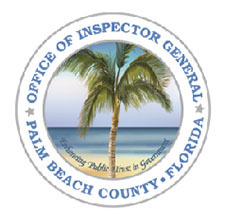The Fourth District Court of Appeal issued an opinion Dec. 21 reversing the trial court’s judgment in favor of Palm Beach County’s ability to charge municipalities to support the cost of maintaining the Palm Beach County Office of the Inspector General.
The appellate opinion found that the county charging the municipalities violated their right of sovereign immunity and constituted an unlawful tax.
The appeal was made by 13 Palm Beach County municipalities against the county and Clerk & Comptroller Sharon Bock.
Local municipalities, including Loxahatchee Groves, Royal Palm Beach and Wellington, were not parties in the lawsuit, which began in 2010 when voters approved a referendum by a 72 percent vote to include municipalities under the inspector general’s oversight. Wellington was party to the lawsuit initially but later withdrew.
Inspector General John Carey said his office has not been receiving the money from the municipalities, and as a result has been operating at a staff level of 23, rather than the 40 that was budgeted to serve the needs of both the county and its 39 municipalities.
“It has been a long-going court issue since the office has been in existence,” Carey told the Town-Crier on Wednesday. “Recently, the circuit just ruled in favor of the cities.”
Carey stressed that the case is between the municipalities and the county.
“It’s not the cities against the inspector general,” he said. “It’s a matter of funding. Every level, from the start to the appeals process, they emphasized to the judges that they are not against the concept, the jurisdiction, the authorities or the oversight of the IG. It’s about how the office is paid for.”
He said that his office will continue to do its job, no matter what lawsuits are underway.
“I don’t pay attention particularly to what cities are involved in the lawsuit or what cities are paying,” he said. “There are some cities that are paying voluntarily to the county, according to the original charter, and there are some cities that aren’t.”
Carey said that he and his staff will continue to do the job fairly, without any consideration of which jurisdictions are party to the lawsuit.
However, Carey is disappointed in the result of the appeal, since his office will continue to operate with reduced funding.
“That’s a matter for the court to decide,” he said. “My disappointment is in how we continue to function at half-staff. We continue to function at this reduced level, not fulfilling completely what the citizens voted for. We continue to do our job with the resources we have to guard our taxpayer dollars, to be the independent watchdog for the citizens of Palm Beach County. I tell folks that even if it’s just me, I’m going to do my job, to do what the citizens of Palm Beach County expect and want and demanded of their government.”
Carey looks forward to one day having a fully staffed office. He pointed out that the appellate court opinion in effect requested an appeal to the Florida Supreme Court because the decision potentially could affect the framework of how municipalities and counties interact throughout the state.
“They sent the question themselves to the Florida Supreme Court because it was such an important issue,” Carey said, explaining that the opinion asked whether municipal sovereign immunity bars a county from charging municipalities for a countywide inspector general program implemented pursuant to a voter-approved referendum requiring the establishment by ordinance, applicable to the county and all municipalities approving the referendum, to be funded by the county commission and all other government entities subject to the authority of the inspector general.
“This, no doubt, will not be the end of this. The Florida Supreme Court now has the option to whether they want to take on that question, and answer that question,” Carey said. “There’s probably more to follow on this.”
Royal Palm Beach Village Manager Ray Liggins said that the village had agreed to pay its share of the cost on the condition that the county repay the village if it lost the lawsuit.
“They gave us their agreement, and we approved their agreement on one condition, that is if they lost the lawsuit, they would have to pay us back,” Liggins said. “They were unwilling to sign an agreement that had that clause in it.”
Liggins said that the village made one payment, and Bock put the money in escrow and did not send another bill out. He added that the county used a municipal funding mechanism that charged vendors 0.25 percent of the cost of the contract to fund the inspector general’s office, which had never been used before.
“The county chose to use an unprecedented funding source,” Liggins said. “They had a plethora of other funding sources. They chose a very different, new approach that was controversial, and they lost, so the ball is back in the county’s court. What are they going to do?”
Liggins pointed out that county jurisdiction does not stop at the municipal boundaries.
“The county has options to charge residents and voters within each of the cities, and the unincorporated areas,” he said. “The services that are identified that the IG will provide are all part of that ordinance, and all that is good. Instead, the county chose a never-before-tested method that crossed the lines of existing laws.”








